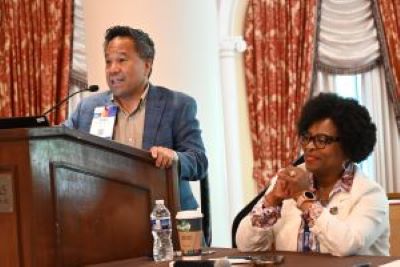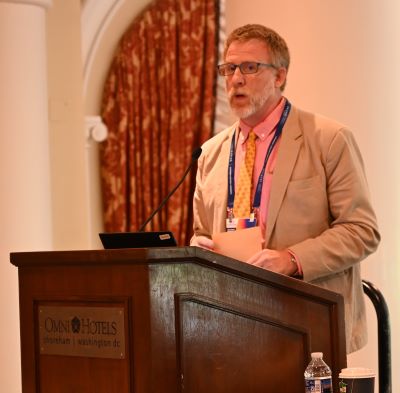 Victor Manalo, left, and Sherron Wilkes
Victor Manalo, left, and Sherron Wilkes
“At the end of the day, politics is not a spectator sport,” NASW CEO Anthony Estreet, PhD, MBA, LCSW-C, said during a presentation at NASW’s national conference in June.
Panelists for the preconference workshop—“Social Work is a Political Profession”— outlined why it’s important for social workers to be involved in the political arena.
Sherron Wilkes, DSW, MSW, program director and clinical assistant professor at the University of Alabama, pointed out the NASW Code of Ethics lays the groundwork for what social workers do, including engaging in social and political action that seeks to ensure all people have equal access to the resources and opportunities that meet their basic needs and to develop fully.
“Politics is social work with power,” she said.
Victor Manalo, PhD, MSW, the immediate past president of the NASW California Chapter and a retired social work educator, shared what he has learned from serving 12 years on the Artesia, Calif., City Council, including two terms as mayor.
“The elected officials don’t have anything to do with the day-to-day running of the city,” he explained. (Elected officials) create the vision and the policy for the city.”
“The city manager, as the executive director of that city, then implements it,” Manalo said.“She can implement that through her staff, which are the people who work for the city, public works, department of immigration, law enforcement, and other folks that work in cities. They actually provide the services to the members of the public and their constituents.”
In the best of all possible worlds, members of the public interact with elected officials and the city staff, Manalo said. When these parts work together, “then all of the policies and programs that come out of that government really serve the interest of the people because everyone is involved.”
“That’s the ideal way government should work,” Manalo said. “But what I have learned after 12 years is this is how it works: (Members of the public) don’t get involved. In my experience, you only get involved when you are (angry about) something. I don’t think government should work that way.”
When the public fails to engage with their elected officials, those leaders can only surmise the populace is content with the status quo, he said. “So, if you are not involved, we’re happy, because we can make decisions without you. That is what is happening. By not getting involved, the status quo remains in your city.”
To move beyond that, it is vital that social workers build relationships with government leaders and others.
Manalo suggested social workers find out who are the stakeholders, elected officials and staff in their communities. “Those are the people you should be developing relationships with,” he said. “It’s easy to do.”
 Will Francis
Will Francis
Will Francis, the executive director of NASW’s Texas and Louisiana chapters, noted that getting involved in politics is paramount since many states are proposing to criminalize the work that social workers perform, particularly when it concerns immigration and reproductive rights.It’s vital to build relationships with government leaders, he said.
“You have to do this together,” Francis stressed. “There is an adage: If you are not at the table, you are on the menu. We have to be at the table with all of these discussions.”